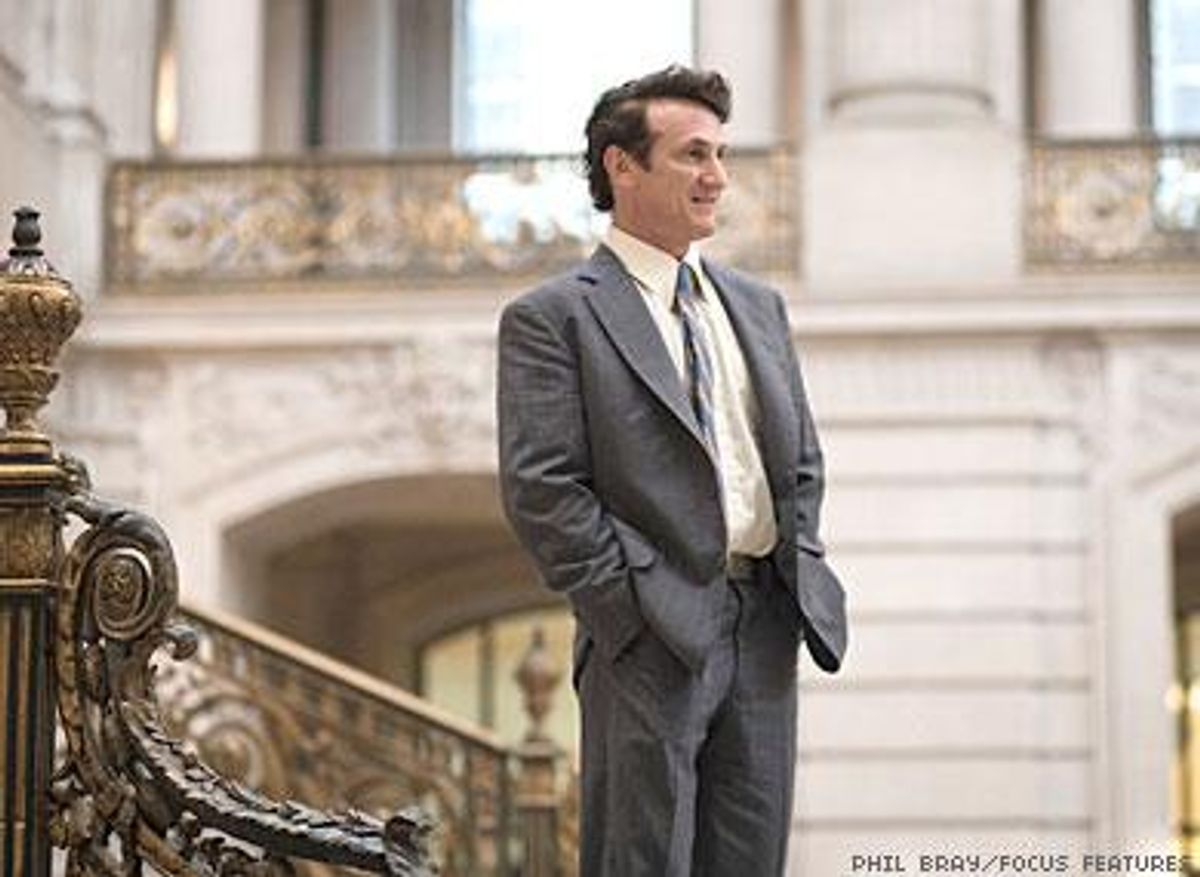
Critics are heralding Milk as an exceptional film. Still, there's one way in which the film is not exceptional but rather utterly conventional: The gay guy ends up dead.
February 14 2009 12:00 AM EST
November 17 2015 5:28 AM EST
By continuing to use our site, you agree to our Private Policy and Terms of Use.

Critics are heralding Milk as an exceptional film. Still, there's one way in which the film is not exceptional but rather utterly conventional: The gay guy ends up dead.
Critics are heralding Milk as an exceptional film. Sean Penn was nominated for a Golden Globe and the film is up for eight Oscars including best actor, best director, and best film. Penn stars as the charismatic Harvey Milk, an Obama-like civil rights figure who builds unlikely coalitions and mobilizes the emerging gay rights movement. The film is timely as it depicts Milk's leadership in defeating a state proposition to bar gays from teaching, a ballot initiative eerily reminiscent of the recently passed Proposition 8 excluding same-sex couples from civil marriage in California. However, there's one way in which the film is not exceptional but rather utterly conventional: The gay guy ends up dead.
Dead gay men, lesbians, bisexuals, and transgender people abound in film, and they fall into two categories: ill (Tom Hanks in Philadelphia, Al Pacino in Angels in America, and Cherry Jones in What Makes a Family) or killed (Hilary Swank in Boys Don't Cry, Matthew Broderick in Torch Song Trilogy, and William Hurt in Kiss of the Spider Woman). LGBT characters who don't end up dead occupy limited and stereotypical roles: murderous (Charlize Theron in Monster and Matt Damon in The Talented Mr. Ripley), criminal (Will Smith in Six Degrees of Separation and Johnny Depp in Before Night Falls), frivolous (Martin Short in Father of the Bride and Rupert Everett in My Best Friend's Wedding), or unfulfilled (Philip Seymour Hoffman in Capote and Dennis Quaid in Far From Heaven). Judging by such films, Hollywood seems to believe the only stories about LGBT people worth telling are tragic ones.
If you think we are being selective, name three major Hollywood films without negative images of LGBT people.
These archetypes are not the product of a monolithic, homophobic Hollywood. In fact, it is often gay people and their allies who direct, produce, and act in these movies. However, when LGBT characters seen in film are disproportionately dead, dangerous, or disturbed, is it any wonder that they are considered less deserving of basic rights? These representations certainly evoke sympathy (or just pity), but perpetual victimhood can be both disenfranchising and self-fulfilling. Feeling sorry for someone doesn't make you want to treat them equally.
The problem cannot be solved by saccharine gay romantic comedies or feel-good after-school specials. There should be more nuanced and diverse representations of LGBT people in American cinema. We've seen plenty of wedding planners, activists, and writers. Where are the gay cops, judges, parents, and teachers? What about lesbian lawyers, grandmothers, singers, and bankers? What about gay people of color and interracial couples? Or bisexual and transgender people who are happy and self-assured? Where is the hard-working, family-loving, person-next-door who happens to be gay but whose role in the film is not premised on pathos?
A recent exception to the stereotypical trend may be Brokeback Mountain, a sensitive and complex portrayal of the romantic relationship between two cowboys. In addition to wide critical acclaim, the film became the eighth-highest-grossing romantic drama in American film history. However, in the end, the film followed the same dead-gay-man pattern with the brutal beating of Jake Gyllenhaal's character.
Did he really need to die for it to be a great film?
These representations matter. Movies provide a lens through which we view history and understand ourselves and others. According to the Pew Research Center for the People and the Press, 60% of Americans do not have an openly gay relative or close friend, and only 25% of these people support same-sex marriage. In contrast, among the 40% of people with an openly gay relative or close friend, 55% support marriage equality.
If more film characters (and their nonfiction counterparts) come out of the closet, tell their stories, and show America that their experiences are similar to and as diverse as those of straight Americans, we might witness a time when more people in more states support equality over discrimination. Had Hollywood produced different types of gay characters on the silver screen, perhaps more people would have voted against Proposition 8 in California and other such ballot initiatives that have been passed in 30 states.
For now, though, we'll settle for a few films where the gay protagonist survives until the credits.
Want more breaking equality news & trending entertainment stories?
Check out our NEW 24/7 streaming service: the Advocate Channel!
Download the Advocate Channel App for your mobile phone and your favorite streaming device!

